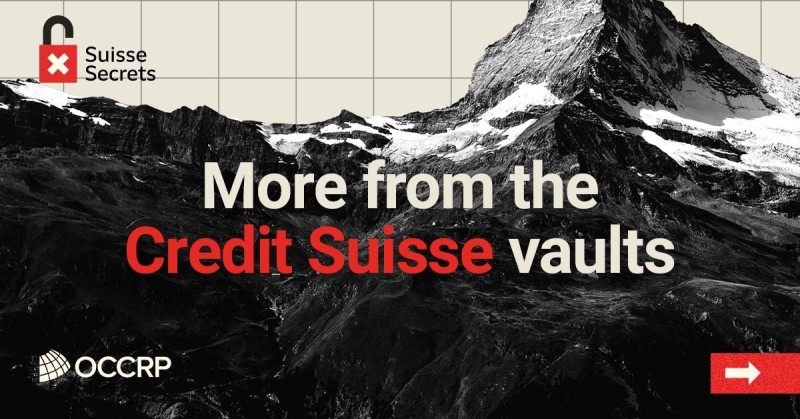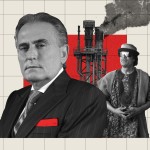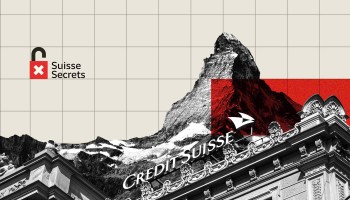Pakistani authorities thought they had scored a victory in 2015 when they forced retired Lt. Gen. Zahid Ali Akbar Khan to plead guilty to having unexplained assets and pay a fine of $2 million.
Yet, what seemed like a win for corruption fighters may have been a defeat.
Leaked bank records reveal that Akbar had stashed away 15.5 million Swiss francs ($11.8 million) in a Credit Suisse account, which Pakistan’s National Accountability Bureau (NAB) never knew about.
“Flouting Pakistani laws, Gen. Zahid not only amassed tons of dirty money, but also got away with it,” said Shoaib Suddle, a former federal tax ombudsman who also headed Pakistan’s civilian secret service, the Intelligence Bureau. “The greater the secrecy of such accounts, the lower the deterrability of anti-corruption penalties, however severe,” he told OCCRP after learning of the new findings.
Akbar is one of several prominent Pakistanis who used Switzerland’s second-largest bank to shield assets from tax officials or corruption investigators, according to the leaked account data obtained by Süddeutsche Zeitung and shared with OCCRP.
The Suisse Secrets Investigation
Suisse Secrets is a collaborative journalism project based on leaked bank account data from Swiss banking giant Credit Suisse.
Data from the Suisse Secrets investigation shows that at its peak, the bank held a total of about $200 million for Pakistanis who came under scrutiny by the NAB — which fights corruption and financial crime — while their accounts were active. In 2000 the NAB launched a high-profile anti-corruption drive, investigating 200 military officers, politicians, and prominent businesspeople, and reporters found 10 people from that list who had Credit Suisse accounts.
“Undoubtedly, the sorts of laundering activities indulged in by Gen. Zahid result in the economic loss of substantial amounts of revenue to the national exchequer,” said Suddle, who wrote a Ph.D. thesis on white collar crime. “Think on how Pakistan’s economy might look like if tax evasion, of all sorts, were to significantly disappear.”
He said the amount of money Pakistan loses to tax evasion could likely balance its budget deficit, which currently sits at around $21 billion, as well as pay off a significant amount of its $120-billion foreign debt.
Cricket, Construction, and Corruption
Akbar, born in 1933, was one of the NAB’s more high-profile targets. He has held several public and influential roles during his long career, including a prestigious job as head of the Pakistan Cricket Board.
In the 1980s, he was seconded from the military to a civilian position as chair of Pakistan’s Water and Power Development Authority. Before that, he was an engineer overseeing major construction projects for the Army, reportedly including its general headquarters in Rawalpindi. He also directed the construction of a secret nuclear research facility, according to Abdul Qadeer Khan, who is known as the "father of Pakistan's atomic weapons program.”
By the time he retired in 1988, Akbar had acquired real estate holdings and other assets well beyond the means of a three-star general and civil servant. The NAB’s investigation, which scrutinized his finances from 1985 onwards, found he had accumulated an unjustifiably large fortune.
The “accused acquired assets, made investments and incurred expenditures in his name and in the names of his dependents… disproportionate to his known sources of income, which he could not account for,” the NAB said in its investigation report, which was submitted as evidence in court.
The law that created the NAB states that the agency can only lay charges for offenses that took place after its formation in 1985. But investigators noted that Akbar had amassed as many as 14 residential, commercial, and agricultural properties before that date that also cost more than he should have been able to afford.
”The greater the secrecy of such [offshore] accounts, the lower the deterrability of anti-corruption penalties, however severe.”
Shoaib Suddle
Former Pakistani federal tax ombudsman
“The known sources of income derived by the accused during the period from 1953 to 1984 were hardly sufficient to justify the acquisition of above referred properties,” said the NAB report.
Investigators were able to tie at least 72 bank accounts to Akbar, his family members, or companies he controlled, including several foreign accounts.
Notably absent from the list was Akbar’s Credit Suisse company account.
The NAB filed corruption charges against him in 2006, but Akbar left Pakistan before he could be tried. Authorities issued an international warrant for his arrest, and he remained a fugitive until being detained in Bosnia and Herzegovina in 2013.
But Akbar managed once again to escape justice in Pakistan. He went instead to the United Kingdom, where he reportedly also holds citizenship.
“We had issued a red warrant for the accused, and we wanted the U.K.'s help in his repatriation and it didn't provide,” said a former NAB official, who requested anonymity as he was not authorized to speak about the case. “We don't have an extradition treaty with the U.K.”
In 2015, Akbar entered into a plea bargain with Pakistani authorities, and the charges were dropped after he admitted guilt and paid his fine.
Akbar did not respond directly to questions about why he had not declared his Credit Suisse accounts or the funds they held to the NAB, or to Pakistan’s tax authority. But he told OCCRP that he had settled his accounts with the Pakistani government. “All funds stand declared to the tax authorities in Pakistan and the tax stands duly paid thereon as per law,” he said in his email.
But a second former NAB official, who had worked on Akbar’s plea bargain, said the agency could take action based on the newly discovered Credit Suisse account.
“It appears that he had other assets too, which have not been included in the investigation,” the former official said in a text message. “NAB can initiate proceedings on the basis of this info.”
Financial Reforms
Credit Suisse declined to answer questions about specific clients around the world who are named in the Suisse Secrets investigation. The bank noted that “the matters presented are predominantly historical,” and that regulations and banking standards have changed over time.
“In line with financial reforms across the sector and in Switzerland, Credit Suisse has taken a series of significant additional measures over the last decade, including considerable further investments in combating financial crime,” the bank said in a statement to media partners involved in the investigation.
Credit Suisse says it has improved its ability to detect problem clients and prevent them from using the bank to avoid taxes or launder money since the early 2000s. But the leaked data shows some of its Pakistani clients were publicly known to be under investigation for financial crimes –– or had even admitted guilt –– at the time they held accounts.
Public Probes, Secret Accounts
Akbar was not the only controversial Pakistani citizen to hold a Credit Suisse account while under investigation by the National Accountability Bureau or other agencies. Here are some others found in the leaked account data:
By the time Akbar opened a company account at Credit Suisse in 2004, his long career in the military and public service would have made him a client who carried some risk. As a politically exposed person, or “PEP” in the parlance of bankers, he would have required extra scrutiny by Credit Suisse’s compliance officers.
Back at home, the NAB investigation into his wealth had been ongoing since 2001, making it illegal for him to sell off assets. But the NAB report reveals that he sold two properties in 2002 and 2003, which were registered under his wife’s name.
“Accused was fully aware of the authorization of investigation against him as he had joined the investigation in 2001,” the NAB said in its report.
Akbar denied that the funds in his Swiss bank account came from the sale of those properties and said in an email that the account holdings “did not originate during the period of the NAB inquiry.”
The leaked Credit Suisse data shows that in February 2006, Akbar’s company account hit its maximum balance of 15.5 million Swiss francs. It was closed in June of that year, three days after the NAB ended its investigation.








